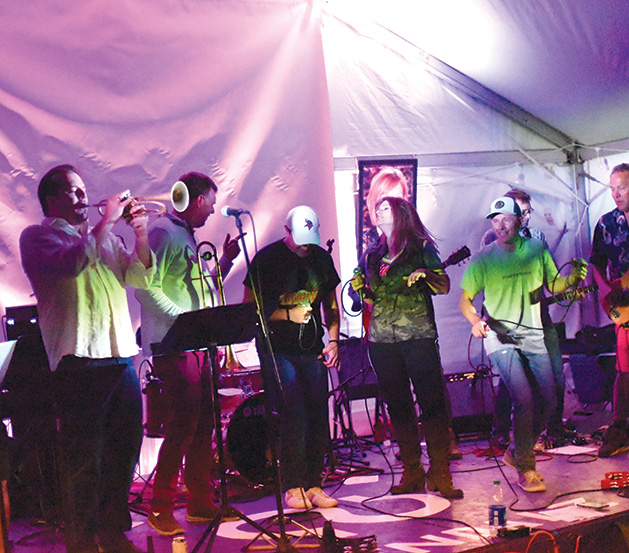
Bash for Brains returned to Woodbury last fall for its sixth year, drawing over 300 guests and $57,000 between donations, entry and raffle tickets, and a silent auction. As always, proceeds went to the Walk to End Alzheimer’s, a national campaign supporting research into the increasingly diagnosed yet little-understood disease, and to the Bash for Brains fund. Event organizers Leah Huxtable and Eva Thompson also took this occasion to announce a brand-new initiative aimed at providing support for caregivers of Alzheimer’s patients. In partnership with the Woodbury Foundation, Huxtable and Thompson are working to offer financial assistance to local caregivers who may benefit from respite care.
Sisters Huxtable and Thompson started the charity event back in 2012, as a way to honor their mother, Lucy Thompson, who developed early-onset Alzheimer’s at the young age of 59 and passed away after five years of illness. “It’s a very strange disease,” says Huxtable, who was her mother’s primary caregiver during those final years. “It felt like I lost her, and then I lost her again, and then she died. It was devastating. She was my very best friend.” Huxtable describes her mother, a fourth-grade teacher, as a “really impactful woman with a lot more to give.” The Bash for Brains grew out of the sisters’ desire to turn their grieving into giving. “We wanted to really go for it. It’s uncommon for people to get up in arms enough about a cause to really make a difference, but we wanted to do that, for her.” Though they did not have a background in grant-writing or administration, Huxtable says, “We’ve always been good a throwing parties, so we thought, ‘Why not start there?’”
As in years past, the party took place in Huxtable’s own backyard. There was live music from Brian Muller. Along with drinks and dinner, guests had the opportunity to enter raffles and place bids on incredible prizes. Big ticket items included a weeklong getaway to Puerto Vallarta, a guided hunting expedition in South Dakota, and tickets to NBC’s The Voice.

Intended to educate as much as entertain, the evening began with a presentation on Alzheimer’s, which included key facts and figures supplied by the Alzheimer’s Association, as well as personal stories from community members whose lives have been directly affected by the disease. “We really wanted people to get a sense of the scope, and especially the cost of care,” Huxtable says, adding that the Alzheimer’s Association projects that this disease—now among the top six leading causes of death for adults in the U.S.—will cost this country a trillion dollars a year by 2050. “And that’s in Medicare alone. It’s insane,” Huxtable says, explaining that this figure is so high not only because this is such a slow-moving disease, but also because a person with late-stage Alzheimer’s requires round-the-clock care.
This Huxtable knows from experience: “When Mom was sick, she came to live [with us] for close to three years. The hardest part was that I was taking care of her and raising my four young kids at the same time. Caring for an adult with Alzheimer’s really is like caring for a toddler. Mom was in really good physical shape. She was young and healthy. So sometimes she would run out the door when I wasn’t looking, when I had my back turned, and then she would be gone, she would just be off wherever in Woodbury in minutes. She was so fast. I think I called the police over a dozen times.”
Luckily, Huxtable’s doctor drew her attention to the very real risk of caregiver burnout, urging her to take some time for herself. “Burnout is a really big problem when you are caring for an Alzheimer’s patient because it’s like living in the movie Groundhog Day. I don’t know any other way to describe it. It’s always the same and you never get anywhere, and you never will. The disease can be so slow to progress; it gets to the point where you are almost just waiting for them to die. And that’s a horrible feeling to have about your parent or loved one.” Huxtable made the decision to hire a professional caregiver, who would come in and take over a few hours a week. She says, “It made a huge difference, having those hours where I didn’t have to worry about my mom.” This sort of assistance can also be a real boon to older caregivers, and the most common caregiver for an individual with Alzheimer’s is his or her spouse.
While she recognizes the value of respite care, Huxtable also knows that this is a privilege, inaccessible to many. “There are people who end up having to quit their jobs to take care of a patient. They certainly cannot afford to have someone come in. It can be incredibly expensive, sometimes as much as 50 dollars an hour,” she says. This is why Huxtable and Thompson were motivated to start their grant through the Woodbury Foundation. They raised enough funding to seed the grant, and Woodbury residents who are primary caregivers for an Alzheimer’s patient will be able to apply for financial assistance towards respite care.
Huxtable is hopeful, thanks in part to her experiences over the past six years. “What I’ve learned about Woodbury is: when people are asked, they show up. We don’t ask for help often enough. But when you do, people are willing to give, and I’m incredibly grateful for that.”









